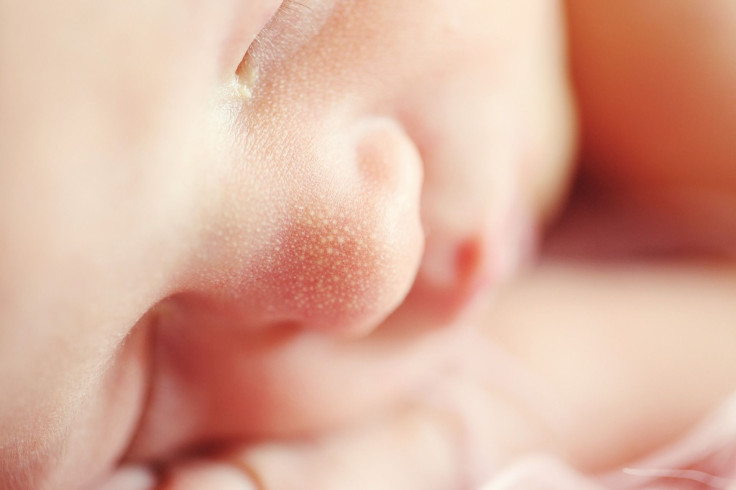Drinking While Pregnant: Baby's Facial Features Changed By Any Amount Of Alcohol, Says New Study

A new study indicates that drinking alcohol even moderately during pregnancy could cause facial changes in infants. Babies whose mothers drank any amount of alcohol had subtle changes to their facial features which were not visible to the naked eye. Using a 3D analysis, small changes to the nose, lips and eyes could be detected.
Australian researchers captured photos of 415 one year olds using three-dimensional photography to determine if alcohol had changed facial features in the womb. Moms answered questionnaires about alcohol consumption dating back three months before pregnancy and for each trimester following.
Frequency was categorized as low-level exposure (around 20 grams of alcohol per drink or 70 grams per week); moderate level exposure (21 to 49 grams of alcohol per drink or 70 grams per week); high levels of exposure (more than 70 grams per week); and binge drinking (at least 50 grams per instance or more). Moms who didn’t drink at all served as the control group in the study.
"We were surprised to see that these comparatively low levels of alcohol do have a subtle impact and our findings support national recommendations to abstain from drinking alcohol in pregnancy," study co-author Jane Halliday, PhD and professor at the Murdoch Children’s Research Institute, said according to an article on Medical Xpress.
It’s common knowledge that drinking while pregnant isn’t the best idea, but the term Fetal Alcohol Syndrome was born in 1973 after a study revealed that alcohol could have negative developmental effects on babies. In 1998, a Surgeon General's warning was displayed on alcohol about the potential impact of drinking while pregnant. In recent years, some doctors have advised that the rare glass of wine couldn’t hurt, and some mothers choose to imbibe on occasion.
Read: Baby Blues Diet: Nutritional Supplements May Prevent Post-Partum Depression
Symptoms of Fetal Alcohol Syndrome include facial differences like a shorter space between the eyes, thin upper lip and flatter face.
But not all experts are impressed with these new findings. Susan Astley, director of the Washington State Fetal Alcohol Diagnostic and Prevention Network, told health website STAT News, “We’ve known for 20 years that the face [associated with FAS] is presented on a continuum.” Astley also went on to say, “In my opinion, they have not really contributed to the literature because they’ve made the reader think that most of the literature doesn’t exist yet.”
Read: Children From Poor Families Show Signs Of Puberty Faster; Health Risks Of Early Development
Still, some believe that a more liberal outlook of moderate alcohol consumption is Ok. Dr. Howard LeWine believes the evidence that occasional drinking harms infants is weak. As he writes on the Harvard blog, “Looking at the evidence, a strict recommendation to have zero alcohol during pregnancy seems extreme.” LeWine points to research indicating that light drinking during the early stages of pregnancy have little impact on premature births or low birth weights. However he also points out that the debate will likely go on.
“Will there be consensus about whether it’s safe for a pregnant woman to have a glass of wine or a beer once or twice a week?” he writes. “I don’t think we will see that any time soon.
See Also:
A Bitter Divorce Between Parents Can Have Lasting Health Effects On Children
Newborn Baby Holding IUD Proves Birth Control Isn't 100 Percent Effective



























